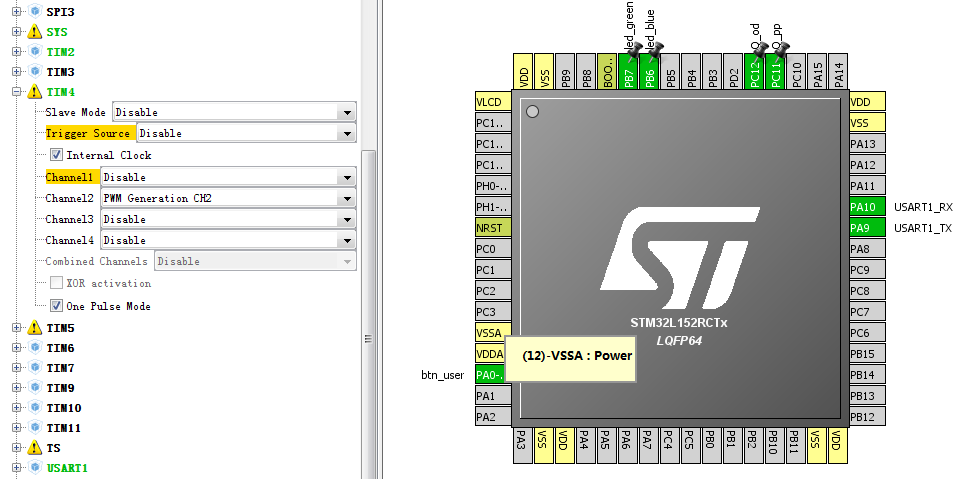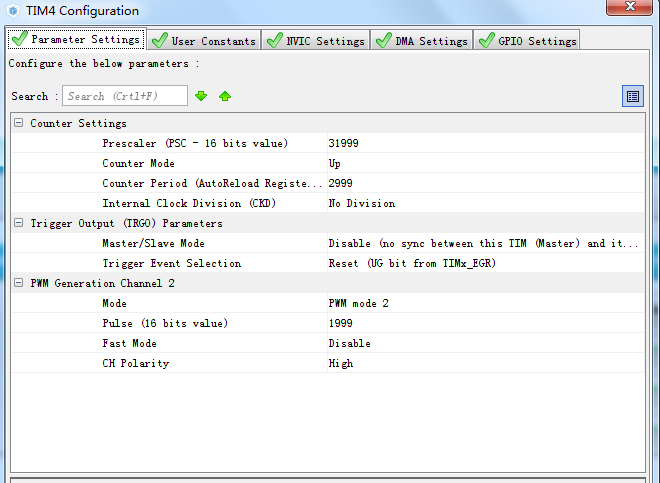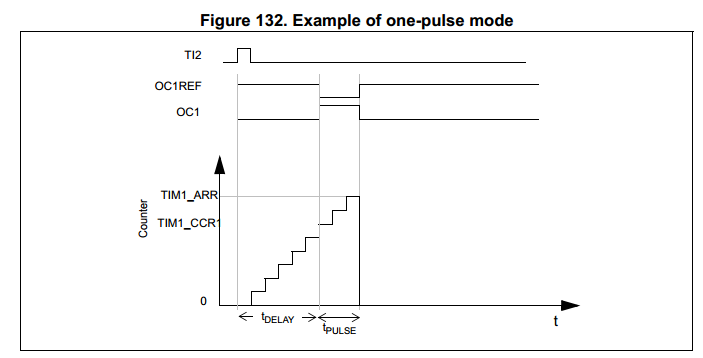STM32定時器單脈衝輸出
使用stm32cubemx配置外設,程式碼使用HAL stm32f1 v1.3.1庫。
用的是stm32l152c開發板,時鐘頻率32MHZ。
這裡,沒有配置中斷。
上圖的意思是,TI2收到1給正脈衝,觸發TIM1開始計數,經過 tDelay後,OC1輸出低,經過一個tPulse後,OC1又恢復為高。
The OPM waveform is defined by writing the compare registers (taking into account the clock frequency and the counter prescaler).
• The tDELAY is defined by the value written in the TIMx_CCR1 register.
• The tPULSEis defined by the difference between the auto-reload value and the compare value (TIMx_ARR - TIMx_CCR + 1).
Let’s say you want to build a waveform with a transition from ‘0 to ‘1 when a compare match occurs and a transition from ‘1 to ‘0 when the counter reaches the auto-reload value.
To do this you enable PWM mode 2 by writing OC1M=111 in the TIMx_CCMR1 register. You can optionally enable the preload registers by writing OC1PE=1 in the
TIMx_CCMR1 register and ARPE in the TIMx_CR1 register. In thiscase you have to write the compare value in the TIMx_CCR1 register, the auto-reload value in the
TIMx_ARR register, generate an update by setting the UG bit and wait for external trigger event on TI2. CC1P is written to ‘0 in this example.
向比較暫存器寫入數值(考慮時鐘頻率和計數分頻來計算)來定義OPM波形。
1)tDelay值是TIMx_CCR1暫存器值
2)tPulse的值是 自動重灌值減掉比較值: (TIMx_ARR - TIMx_CCR + 1)
假如,當比較相符發生時,你希望得到從0到1的波形,而當計數器達到自動重灌值時,波形又從1變到0.
這種情況,使用PWM模式2,TIMx_CCMR1 暫存器的OC1M要為111。可選:使能重灌暫存器。 在此例子中,你需要把比較值寫到TIMx_CCR1 暫存器,自動重灌值寫到TIMx_ARR暫存器,設定UG位產生一個更新事件,並且等待TI2的外部觸發事件。CC1P被寫為 0.
看了手冊上面的描述,就明白了:
我按下按鈕,延時2秒,點亮綠燈,停1秒,綠燈滅。
如果是控制可控矽,就是:
檢測到零點,延時x微秒,觸發可控矽,停1毫秒,關掉可控矽。 生成觸發脈衝。
可以讓硬體自己處理,不用中斷。
開發板實現描述1.
while (1)
{
/* USER CODE END WHILE */
/* USER CODE BEGIN 3 */
if (HAL_GPIO_ReadPin(GPIOA, GPIO_PIN_0) == GPIO_PIN_SET) {
HAL_Delay(100);
if (HAL_GPIO_ReadPin(GPIOA, GPIO_PIN_0) == GPIO_PIN_SET) {
__HAL_TIM_ENABLE(&htim4);
HAL_TIM_OnePulse_Start(&htim4, TIM_CHANNEL_2);
}
}
}
/* USER CODE END 3 */
}HAL_TIM_OnePulse_Start函式有問題,它總是使能1、2兩個通道,而且它不啟用定時器的計數。
因此,在它之前要使用巨集 __HAL_TIM_ENABLE,置位 TIMx_CR1的CEN。
需要注意到,單脈衝功能,只能在1、2通道上做。



